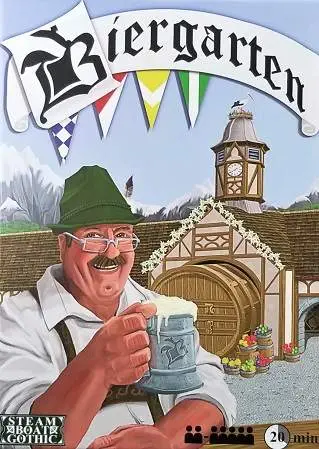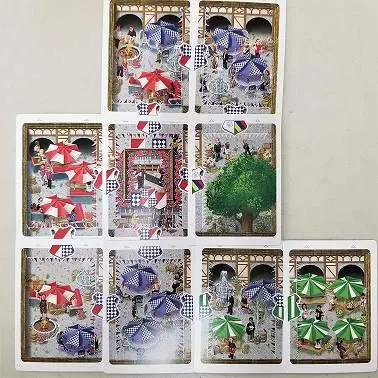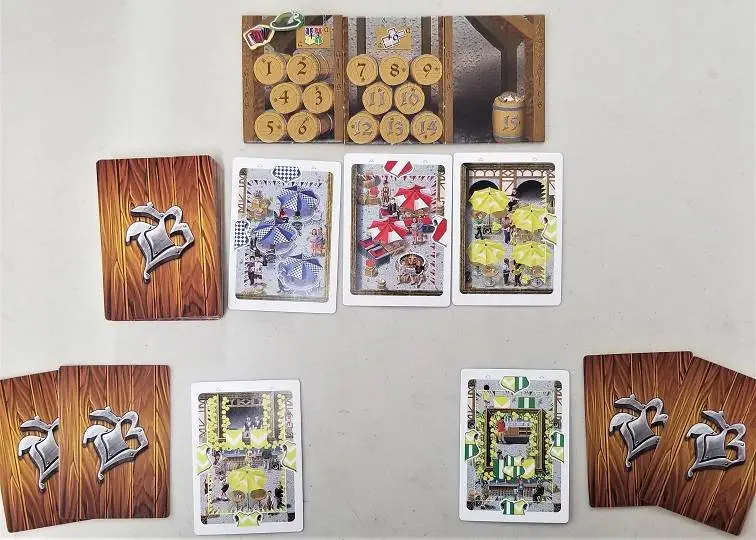
Oktoberfest is held every year from mid-September into the first week of October and is celebrated by people the world over. We here at The Cardboard Cantina are fascinated with celebrations centered around food and drink, and this one is no exception. Not everyone can enjoy a traditional ale or lager during these festivities, but we present to you a card game that gives everyone the chance to participate! Biergarten is a game about designing and building your own beer garden and selling barrels of your brew in the process. You will attract patrons, and thus earn points, by playing cards from your hand as you layout the design and do your best to outperform the other participants.
Biergarten was originally a Kickstarter campaign successfully funded in early 2016. Designed and illustrated by Andrew Sallwasser, who also worked on the game Fences, it hit several of its stretch goals and had the campaign featured as a Project of the Week on Board Game Geek. It is a very well-designed game and went through several versions as it was developed. Sallwasser has been a gamer his whole life and the design for Biergarten illustrates his love for the hobby. He gives credit to his wife for the business side of things, and between the two of them, this quick little game was born.
To get a game of Biergarten started players will first need to separate the common and home decks before shuffling each separately. They should also decide if they want to play a shorter or longer game and set up the score tracker accordingly. Each player is dealt two cards from the common deck before the top three cards of the home deck are placed face up to form a selection that each player, beginning with whoever most recently visited an actual biergarten, will draft a card of their choice from. Each time a card is chosen it will be replaced by another from the deck until all players have a home card and two common cards in their possession. The leftover home cards are all returned to the box and the common deck is set up in the same fashion with three cards placed face up to form a supply to draft from.

On a player’s turn, they will take a card from one of three sources; the supply; the top of the deck; or blindly from another player’s hand. They will then choose one of the three cards in their hand to add to their garden. Cards do not have to be played in a manner that earns points, but it should be noted that they must be adjacent to other cards already in play. Next, the active player may choose to move one or swap two cards around. Their score is then recalculated, however, players have a lot of options available to them. In the short term, points are awarded for matching colors between cards, but bonus points can be accrued as the game progresses. For example, if a player manages to wall in their entire Biergarten, they will earn an additional six points regardless of matches within the walls! Points can also be lost during the recalculation, so it is important to remember that scores are fluid throughout the game. The first player to reach a set number of points (either 10 or 15) will trigger the end of the game. All other players will get one final turn and the end game triggering player will get one final chance to swap or move their cards. The player with the most points wins while ties are awarded to the person last in turn order.
Biergarten is fun, quick, and easy to get teach to friends. It does have a tactical element that, while engaging, does not overshadow keeping the game lighthearted. It was definitely a pleasure to get these cards out in our group as we sat around the table and enjoyed an evening together over food, drinks, and game. Our only complaint was the layout of the score track. The barrels snaking through the cards instead of simply going in numerical order caused some confusion since scores are fluid so score markers are constantly moving up and down on the track. Otherwise, we love that Biergarten is completely language independent other than the rules and that the game was designed in such a way that it is colorblind-friendly. Each colored umbrella and shield have their own design to make it easier to tell them apart. With the inclusion of two game modes (long or short), we found we enjoyed playing the longer game more as it gave us more opportunities to have a strategic game than making a mad dash for points. If you like games tile-laying games and are looking for something that can be played in a matter of minutes, we highly recommend giving Biergarten a try!
All photos of Blue Wing Games and Steamboat Gothic Studio products were taken and edited by Krista.
